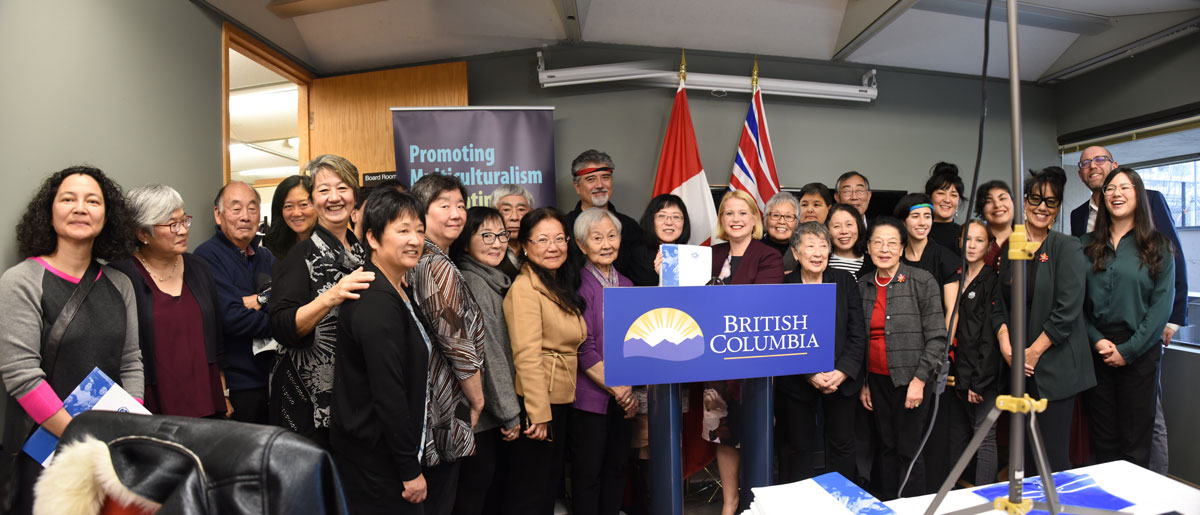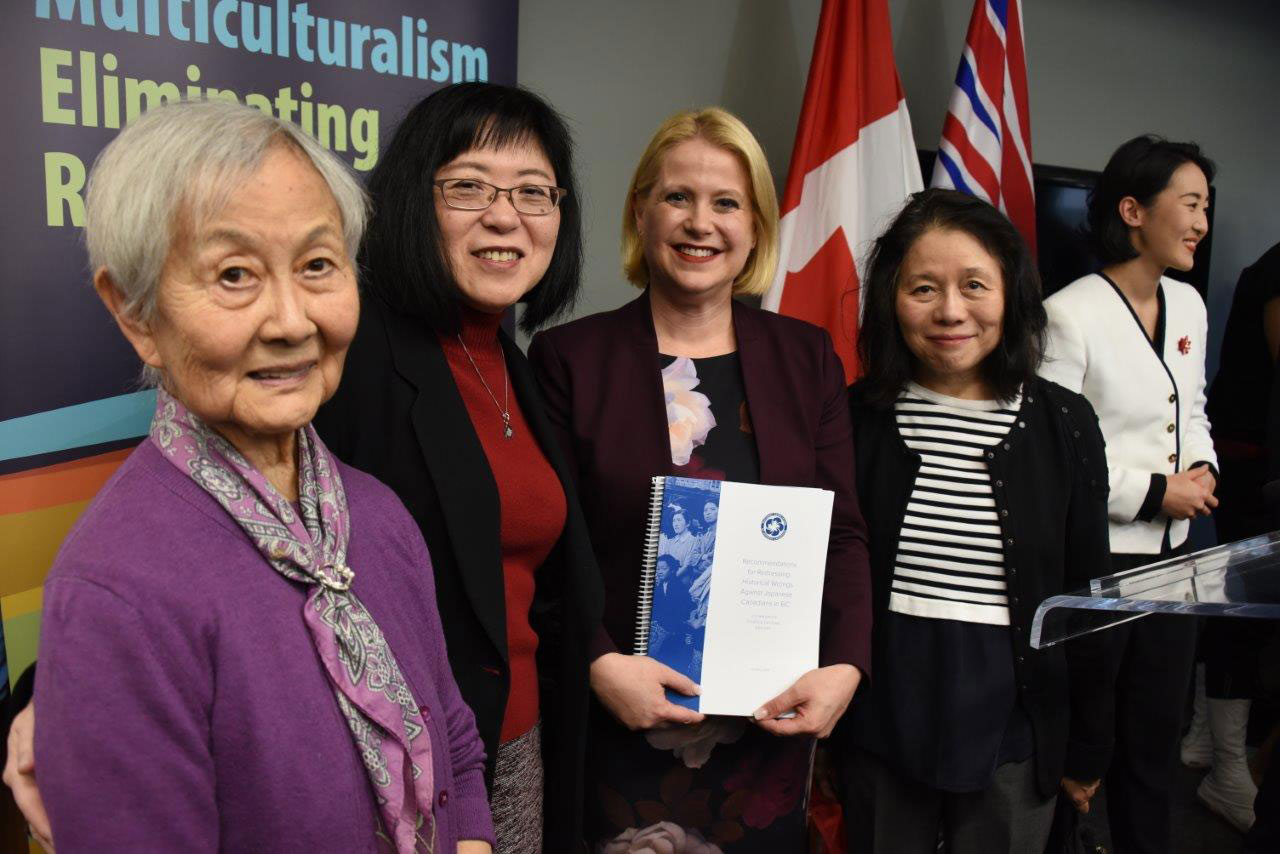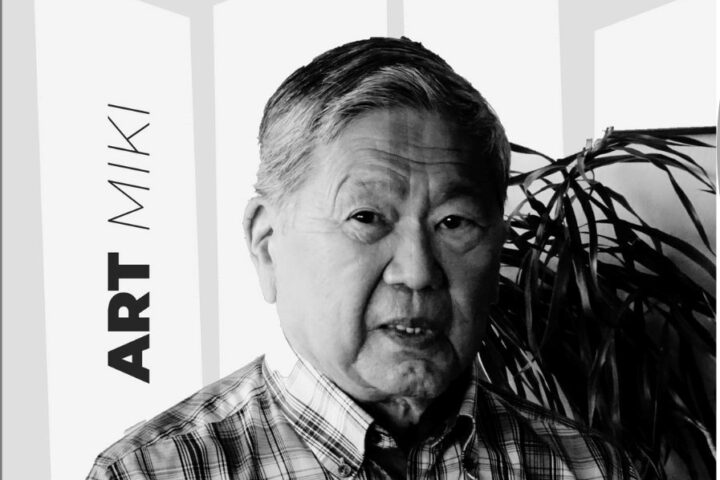
Japanese Canadians Deliver BC Government Essential Actions for Rebuilding Community following Historic Wrongs of Internment
A delegation from the National Association of Japanese Canadians met with the BC Government on Friday, November 15 to hand-deliver a report recommending key actions to address the historic wrongs committed against Japanese Canadians. The report, Recommendations for Redressing Historical Wrongs Against Japanese Canadians in BC, presents the results of months of community consultations with hundreds of Japanese Canadians about initiatives government could undertake as meaningful follow up to a 2012 Motion of Apology in the BC legislature.
“The Japanese Canadian community recognizes and appreciates the symbolic apology made by the B.C. government in 2012”, said Oikawa. “However, no meaningful action followed that apology. This report examines what is needed to rebuild the Japanese Canadian community, including reclaiming a physical presence in the cities in which we were erased, and ensure what happened to us never happens again to Canadians of any ethnicity or orientation. This is an opportunity for us to foster positive changes that not only pay tribute to Japanese Canadians but benefit BC society as a whole.”
As early as the late 1800s, BC’s provincial government conducted a campaign to discriminate against, harass, and deny the rights of Japanese Canadians. The provincial government used WW2 as an excuse to uproot and dispossess Canadian citizens of Japanese descent of their homes, property, and livelihoods, erase them from their communities, and force them into internment camps and deny them an education. In contrast with US policy, the BC provincial government forced Japanese Canadians to endure internment and exile until 1949, a full four years after the war had ended. Not one Japanese Canadian was ever charged with an act of disloyalty.

The consultation process provided an opportunity for Japanese Canadians to share family stories and reflect on the history of internment and the lasting impact on individuals, families across generations, and the Japanese Canadian community.
The report makes five key recommendations:
1. Deliver a formal apology from the BC Premier acknowledging the full extent of the BC Government’s role for the historical record. We are asking the Premier of BC to deliver a formal acknowledgement of the wrongs committed by former BC governments that led to the injustices faced by Japanese Canadians and deliver a sincere apology to those surviving Japanese Canadians directly affected by the injustices of incarceration, forced displacement, dispossession and exile. The apology should be delivered in the Provincial Legislature and consult the Japanese Canadian community regarding wording.
2. Restoration or reclamation of cultural and community spaces. Provide funding for operation of new and existing museums, historic sites and monuments; and restore and reclaim historic community spaces (e.g., historic Japantown). Establish physical memorials and an official day to commemorate the franchise and free movement granted to Japanese Canadians in 1949.
3. Create a Japanese Canadian Community Legacy Endowment Fund. Establish an endowment fund administered by the Japanese Canadian community to support community development activities and needs, such as seniors’ care and housing, community wellness and healing programs, community gathering programs to rebuild fragile communities, post-secondary scholarships for students of Japanese Canadian descent, and anti-hate initiatives.
4. Develop and embed Japanese Canadian history permanently in the B.C. curriculum. Include Japanese Canadian history in mandatory school curricula; offer effective professional development training for teachers; create grants for teaching tools and create a digital library of Japanese Canadian history; present the events of the 1940s in the broader context of colonization and the politics of discrimination.
5. Take concrete steps to combat hate and racial discrimination. Create an independent body to assess B.C.’s strategy, as well as research, develop, and implement BC-based anti-hate programs and policies to counter growing incidents of hate-motivated actions and speech in communities and society.
The National Association of Japanese Canadians is seeking swift action and partnership from the BC government to implement the measures recommended in the report. Implementation of the redress measures are fundamental steps in the reconciliation process with Japanese Canadians and will assist the province to move forward as a welcoming and inclusive society.
The Report was prepared by the National Association of Japanese Canadians (NAJC), a Canada-wide organization that represents Japanese Canadians and Japanese Canadian member organizations. NAJC was founded in 1947 to provide community development to people scattered by the internment policies, to promote and develop a strong Japanese Canadian identity and to strengthen local communities and the national organization. We strive for equal rights and liberties for all persons, in particular for racial and ethnic minorities and to ensure the wrongdoing and harm inflicted on our grandparents and families does not occur to any other Canadian.
The full report, Recommendations for Redressing Historical Wrongs Against Japanese Canadians in BC Community, as well as the complete appendices, can be downloaded HERE
Minister’s statement on the National Association of Japanese Canadians’ report
Lisa Beare, Minister of Tourism, Arts and Culture has issued the following statement after receiving the National Association of Japanese Canadians’ report, Recommendations for Redressing Historical Wrongs Against Japanese Canadians in BC: Community Consultation:
“We recognize the significant harm that came to Japanese Canadians as a result of provincial government actions before, during and after the Second World War.
“That's why we provided $30,000 to support the National Association of Japanese Canadians in holding a series of meetings that would provide a forum for community members to offer their recommendations for legacy initiatives.
“I want to thank the National Association of Japanese Canadians, as well as everyone who took part in the meetings, for their contributions in these consultations. This is important work, and I was pleased to formally receive the report today.
“The report includes detailed recommendations on how we can move forward together and properly acknowledge the hardship people suffered as a result of government actions.
“We are now taking the time to carefully review the recommendations. Once this is completed, I look forward to continuing to work with the association on a plan for legacy initiatives that bring awareness to these historic wrongs and make sure they never happen again.”
Video of November 15 presentation



